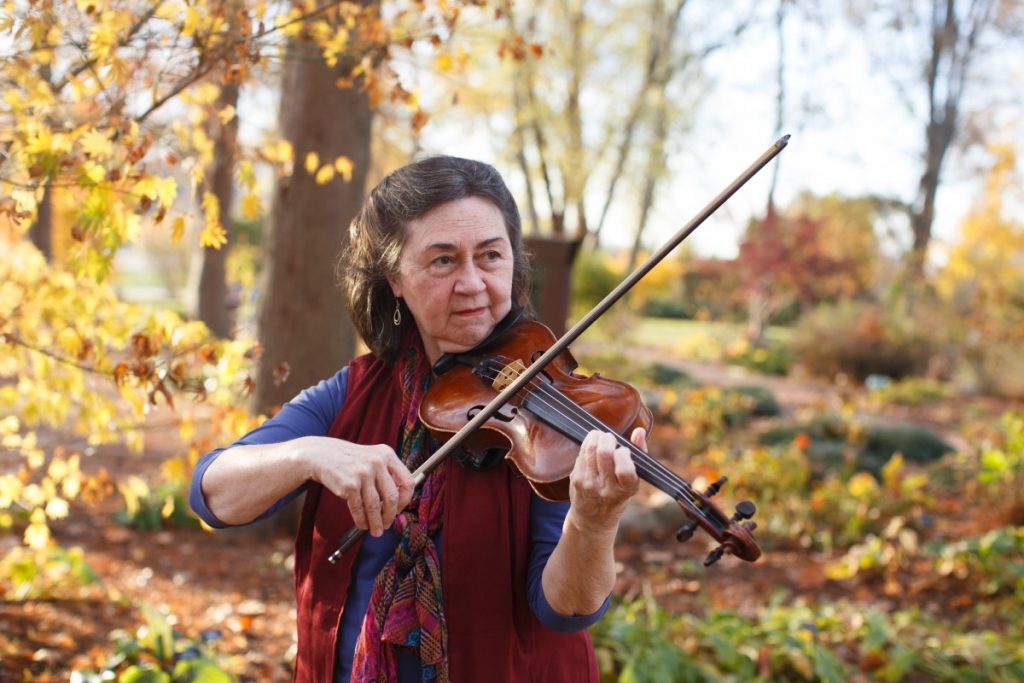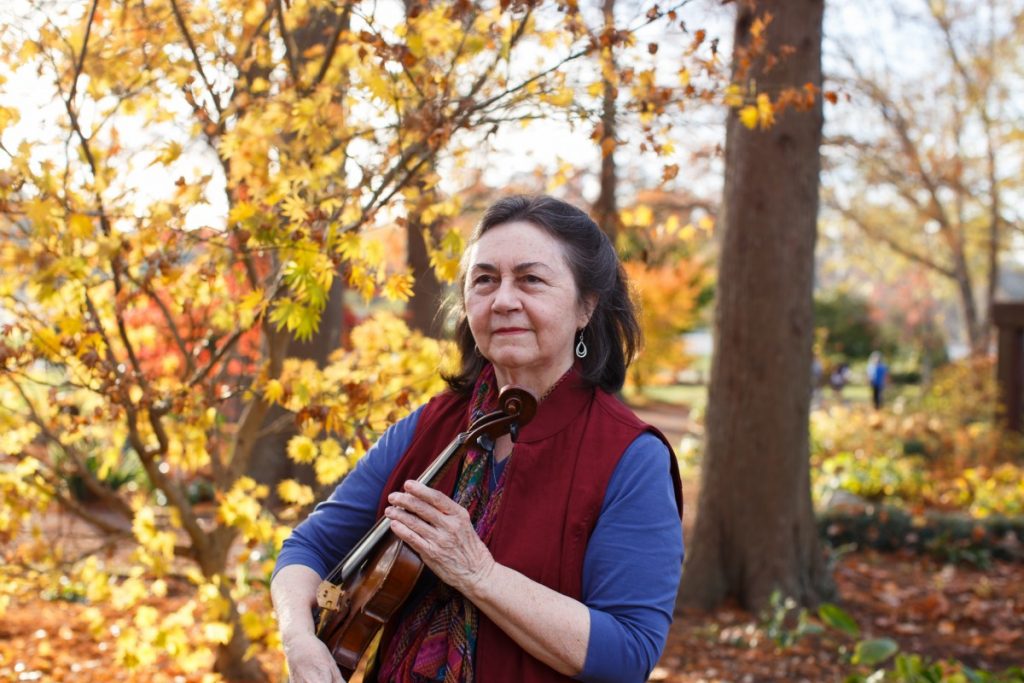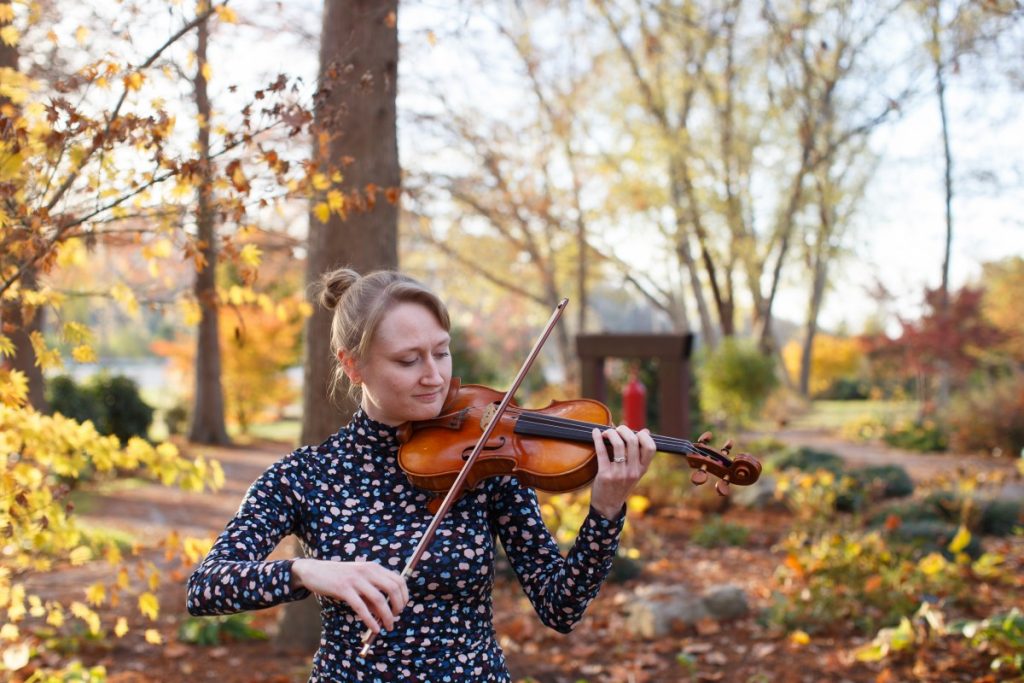One chilly October morning in Knoxville, Tennessee, a strange sound floated across the Gay Street viaduct. Alongside the rumblings of cars and the shakings of trains, it could clearly be heard: two violins, faint but strong, to the tune of the University of Tennessee football team’s fight song, “Rocky Top.” Everyone in Knoxville knows the words to “Rocky Top,” and usually, any instrumental would be accompanied by a raucous singalong. But today, the sound drifted above the buildings on its own, untethered, wordless and almost haunting.
The two violinists were set up on the sidewalk in front of a building called the Emporium, where the administrative offices of Knoxville’s art world are set up side-by-side: the theatre companies, the choirs, the dance companies and, of course, the Knoxville Symphony Orchestra. In front of the building, a line of orchestra musicians, all furloughed from the Knoxville Symphony as of this summer, held signs and banners: “THERE IS NO MUSIC WITHOUT THE MUSICIANS,” “KSO RESPECT OUR CONTRACT!”
The musicians were members of Local 546 of the American Federation of Musicians, otherwise known as the Musicians of the Knoxville Symphony. Though all were employed with the orchestra, none were working. In August 2020, the musicians had been unceremoniously furloughed. This furlough, says bass player and former orchestra committee chair Steve Benne, was in violation of their contract – a new contract that the union had just negotiated.
Benne, along with other union members, had rounded out a full year of contract negotiations, which they had hoped would provide the musicians some level of job security. But management declared the pandemic “force majeure” – an act of God, out of their hands. In response, the orchestra musicians filed a grievance, and it was off to the races.
The Struggle for a Contract
East Tennessee native Liz Farr is a section violinist and committed union member. Farr has played with the Knoxville Symphony Orchestra since she was in high school. She is also trained as a vocalist and supplements her income by leading a church choir. Farr was elected to serve on the union negotiating committee in early 2020, which she was assured would be a very normal year.

Farr doesn’t consider herself much of a rabble-rouser, preferring to negotiate and bargain than strike. The year’s developments, however, would test her limits.
Over the summer when it became apparent that the pandemic would not subside by September, management canceled the fall season and union members and orchestra management began negotiating pay for the upcoming September through August fiscal year. The KSO board proposed a 27.5 percent pay cut to get them through the fiscal year and, hopefully, through the worst of the pandemic until the orchestra could begin performing again. This would reduce the annual salaries for most full time musicians from $31,500 to $18,000 for the 2020-2021 year, after health insurance costs. The agreement also required musicians to maintain their contract retainers, which obligated them to be available for 14 hours a day, six days per week to play for the orchestra at any requested time.
The terms were steep, but some musicians were prepared to agree.
“It seemed at first like a reasonable offer, but it was very one-sided,” Farr said.
Management had told the musicians many times the orchestra was stretched thin financially, but in the spring of 2020, a financial analyst from the American Federation of Musicians found during an audit the KSO endowment – held in a separate trust, under a separate name – had been slowly growing from years of budget surpluses.
According to the auditor’s report, which was provided to 100 Days in Appalachia for review for this story, the endowment contained $9 million in unrestricted funds, almost triple the orchestra’s annual operating budget of between $3 million and $4 million per year.
Some musicians say the orchestra is doing its best, and the endowment should continue to be held for its intended purpose – to support separate initiatives that help the organization grow. Per-service percussionist Andy Adzima maintains that the endowment isn’t for musicians salaries: it’s a separate entity, a separate bank account, with a separate board.
While that’s true, the KSO does draw 4-5 percent annually from its endowment to pay for general operating costs. There is also significant overlap between the board members of the endowment and the orchestra itself.
The musicians told management they weren’t interested in the deal that included the reduced salaries, figuring the contract the union had just finished negotiating gave them ground to stand on. But shortly after, management announced a delay in the season and furloughed all of their performing musicians, as well as some administrative staff. Benne says many musicians did not know they were furloughed until the orchestra’s official Facebook announcement.
“This was a heart-wrenching decision,” KSO Executive Director Rachel Ford said in a press release about the decision. “Continuing forward with our current costs and substantially reduced revenues is not financially feasible. This decision will allow us to sustain the KSO over the long term and not allow a pandemic to bring an end to our region’s longest continuously performing orchestra.”
In September, the KSO Board changed their offer to 72.5% percent of their previous year’s salaries for musicians along with continued health and pension benefits and increased paid leave, but union leadership turned down the deal, according to local news reports.The board also refuted the contract requirements on musicians’ time, saying orchestra members can only be required to work 5 hours per day and must be notified of the scheduled work at least 17 days prior.
A Tradition of Community Music
The musicians’ grievances with the structure of the KSO go back further than August, though. The orchestra operates on a two-tier pay system, with roughly one-third of the 71 musicians on a full-time contract with benefits and two-thirds on a part-time contract.
Full-time musicians, such as Audrey Pride, a young section violinist and union member, depend on the KSO for the majority of their income, while Josh Walker, a more senior, part-time second trombone, holds a full-time job as a lawyer. While Pride and Walker are both invested in the union’s struggle, they face very different stakes.

Two-tiered pay systems have been used by other companies as a union-busting practice, with a lower-paid tier of workers hired generally after the higher-paid workers negotiate a contract for themselves.
There are other differences, too, many simply a factor of the changes the orchestra has undergone over time. Many of the senior members are deeply rooted in the community while the younger members are more likely to have moved to Knoxville for work.
Some say it’s growing pains. KSO started as a community orchestra – a fun activity for adults with day jobs or kids with professional aspirations – but by no means was intended to be a competitor on the national stage. Many of KSO’s older members remember the time when they could join as a high school student.
But times changed. In 1982, Knoxville was set to host the World’s Fair, and the city and the orchestra was readying itself to present on a global stage. In order to become a world-class city, you had to attract world-class performers; in order to attract world-class performers, you had to pay them enough to support themselves and potentially their families. The staff unionized during this time, and though the 1982 World’s Fair was famously a bust, bringing in a grand total of $57 of profit for the city, the KSO was thenforth known as a regionally prominent orchestra.
With the glut of conservatory students in the early 2000s, like in many professions, there were suddenly many more highly-qualified candidates for orchestra musicians than there were jobs. It took Pride, who has played in festivals all over the world, by her estimation at least eight years of searching and 40 auditions to finally found a full-time job in her field.
“It was a grueling process,” she said.
And the work continues to be grueling even after a job is secured. Some of the musicians are quick to point out that while all jobs deserve fair pay, many who enjoy the orchestra’s work may not understand the level of time and investment required to even maintain one’s skill level, let alone improve it.
Many started playing as young as five years old, shelling out hundreds if not thousands for the education and additional training. It’s considered standard to invest thousands of dollars in a top-quality instrument, in addition to maintenance, which isn’t covered by the orchestra. To play at the level now expected at the KSO, musicians also spend many unpaid hours practicing and maintaining their craft.
“I think the average person might not understand that your job is not just showing up for two and a half hours of rehearsal,” said Pride. There is an investment of time and money behind the scenes that goes unnoticed by the public.
‘Knoxville is Not a Union Town’ But It’s History Says Otherwise
The unionization of orchestral musicians isn’t unique to Knoxville. It’s common for orchestras serving major cities, especially in the Northeast and Midwest. Pride says her previous employer, the Dayton Philharmonic in southern Ohio, is a completely unionized orchestra.
That’s not, however, the case for KSO. Out of 71 musicians on contract, 21 have chosen not to join the union.
Collective bargaining, said Pride, is a different process here than it was in Ohio. “It’s been a little bit of a learning curve in a right-to-work state,” Pride added, where unions cannot require workers on any job site to pay union dues, even though nonmembers will benefit from union contract negotiations and representation.
“Not only is Knoxville not a union town,” but the union’s presence makes musicians lazy and looks “ungrateful,” KSO Executive Committee President John Winemiller wrote in a letter to the orchestra’s board, which was provided by Union President Benne to 100 Days in Appalachia.
Knoxville, however, does have a documented history of unionization and the fight for the rights of laborers.
“In the 1880s, early unions called workingmen’s associations had a huge impact on local politics,” said University of Tennessee Appalachian historian Robert Hutton.
According to Hutton, workingmen’s associations were an early form of unionism in Knoxville after the Civil War. They were not always progressive racially, however, and many harbored anti-immigrant sentiment in their defense of local industrial jobs.

Later, the Highlander Folk School, now the Highlander Research and Education Center, in the nearby town of New Market, hosted well-attended labor organizing trainings in the 1960s and beyond for members of AFL-CIO affiliates in town, Hutton said. Highlander has been raided by police and attacked by white supremacists on multiple occasions since it was founded decades ago.
“There’s a rich union history here,” Hutton said, “but it also involves constant antagonism from capital, consistent with what working people of Knoxville have dealt with since the early days of industrialization.”
This unionism persists today. Perhaps the town’s most prominent union is the 20- year-old campus workers’ union, UCW-CWA, at the University of Tennessee, Knoxville, which in 2018, successfully fought a campaign against the privatization of the university’s facilities staff. UT-Knoxville is the city’s largest employer and UCW-CWA works in coalition with Jobs With Justice, a nonprofit that supports strategic campaigns around labor movements whose members include local steelworkers, linemen, ironworkers, teachers and more.
The campaign – which pitted union members against then Governor Bill Haslam – succeeded, proving that union power in Knoxville was not only present, but capable of winning.
Proving Their Worth
As the pandemic has elapsed, Pride and her fellow musicians have watched former classmates and co-workers in other cities work under management that have come up with more creative ways to return to the stage. KSO is one of only a handful of orchestras around the country that have taken this specific cost-cutting route of furloughing musicians rather than finding alternative ways to continue playing.
“We just want them to sit down and talk with the musicians and truly try to understand the musicians’ needs,” Pride said. “It’s a little frustrating that we’re being seen as greedy people.”

The members of the Knoxville Symphony Orchestra have played a couple of independently-organized outdoor shows around town, which have been popular and have raised funds to support the orchestra members and their families through their furlough.
But as the furlough continues without a negotiated return to the stage in sight this year, the union is moving on to arbitration with KSO management, a legal process moderated by a lawyer instead of a judge.The musicians hope to win back their jobs and their full salaries, but also more than that – they want Knoxville to see them as essential to its image, especially as the city works to fashion itself into a cultural capital of southern Appalachia.
“People from all around, from smaller towns, come here to hear the orchestra,” Farr says. “They make it their big night out.”
And Knoxville’s economy benefits from that draw.
At the end of that chilly September day, Benne, the orchestra chair, personally thanked everyone who showed up. That’s what his union members are all hoping for – support and encouragement, a word of thanks from the community. They make it clear: Art is hard work, and they’re willing to fight for their right to be compensated fairly for it.
Community members from all walks of life have helped them along the way, but as Benne said: “Buddy, the boots on the ground part, that’s all Knoxville Symphony, Local 546.”
Caitlin Myers is a writer based in Knoxville, Tennessee. She has written on Southern politics, labor, and environmental justice for Scalawag Magazine, the Daily Yonder and Current Affairs, among others. You can find her on twitter at @stopitkatie.
Editor’s Note: This article originally incorrectly identified Steve Benne as a bassoon player and the KSO union president. It has been updated to reflect his correct title, as well as to make the provisions in the union contract specific to full-time employees more clear. It also corrects the number of musicians that have chosen to join the KSO union.



